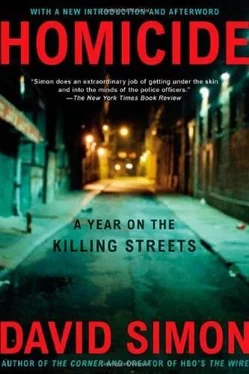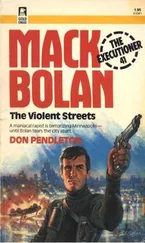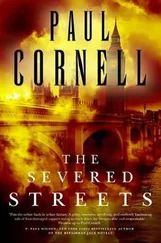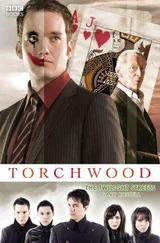“Loretta?” said Rosalind. “She’s my ex-boyfriend’s sister. We’re good friends.”
But Loretta Langley was not good friends with Eugene Dale; they had disliked each other from the very start, Rosalind explained. At that moment, Edgerton had little doubt that the unidentified caller was none other than Eugene Dale, attempting in the clumsiest fashion to blame his girl’s best friend for a rapemurder.
Days later, to satisfy himself that he had been right not to pick up Loretta Langley for questioning on the strength of the anonymous call, Edgerton will interview Langley and tell her, for the first time, of the allegation that they had received in the earliest hours of the investigation. Asked if she would have thought of her best friend’s boyfriend if told about the male caller, she will say no. If he’d talked to her three weeks ago, Loretta Langley would have been nothing more than another dead end; now she is yet another link between Eugene Dale and a child’s murder.
Edgerton arrived at the homicide unit well before Nolan and began to go through the Southern district’s paperwork on the rape report. Later that afternoon, well after Nolan had returned to the office from the raid, Eugene Dale sauntered up to the Gilmor Street address. Before he was grabbed by a waiting district operations unit, he had time to learn of the search-and-seizure warrant and to ask his girlfriend one very telling question: “Did they find the gun?”
He came to rest in the large interrogation room and remained there, ignored for hours, as Edgerton proceeded to interview Michelle and Rosalind. He stayed there long after Kopera arrived and took the revolver-an H &R.32, serial number AB 18407, a weapon now caked in fingerprint dust-downstairs to his lab.
Long after Roger Nolan escorts him to the bathroom, Eugene Dale is still sitting in the box, bored and irritated. Enough time passes so that when Edgerton finally enters the room, his suspect-true to the rule-is on the verge of sleep. As the interrogation begins just after 10:00 P.M., there is no banter and salesmanship; indeed, Edgerton treats his suspect with undisguised contempt.
“You want to talk to me, I’ll listen,” the detective says, pushing the rights form toward Dale. “You don’t want to say anything, I just charge you with the murder and go home. I don’t really care.”
“What do you mean?” says Dale.
Edgerton blows cigarette smoke across the table. With any other murder, all this stupidity might be amusing. With Andrea Perry, it sticks in his throat.
“Look at me,” says Edgerton, raising his voice. “You know that gun in your linen closet, right?”
Dale nods slowly.
“Where do you think that gun is right now?”
Dale says nothing.
“Where is it? Think hard, Eugene.”
“You all got it.”
“We got it,” says Edgerton. “That’s right. And right now, even as I’m talking to you, there are experts downstairs who are matching up that gun to the bullet we took out of that girl’s head.”
Eugene Dale shakes his head at the logic. Suddenly, both men feel a loud thump. A floor below, almost immediately beneath them, Joe Kopera is firing the.32 into a deep canister of water to produce the necessary slugs for comparison.
“That’s your gun right there,” says Edgerton. “Hear it? They’re testing it right now.”
“It’s not my gun.”
“It’s in your fucking closet. Whose gun is it? Rosalind’s? If we show that gun to the other little girl you messed with, she’s going to say it was your gun, isn’t she?”
“It’s not my gun.”
Edgerton stands up, his patience entirely leveled by five minutes in a room with this man. Dale looks up at the detective, his face a mixture of fright and sincerity.
“You’re wasting my fucking time, Eugene.”
“I didn’t-”
“Who do you think you’re fucking dealing with here?” asks Edgerton, his voice rising. “I don’t have the time to listen to your stupid bullshit.”
“Why are you yelling at me?”
Why am I yelling at you? Edgerton is tempted to tell the man the truth, to explain a little of the civilized world to a man living off its fringe. But that would be wasted breath.
“You don’t like people yelling at you?”
Dale says nothing.
Edgerton walks out of the interrogation room with a small kernel of rage growing inside him, a heat that few murderers ever manage to spark inside a detective. Part of it is the stupidity of Dale’s first attempt at a statement, part of it his childlike denial, but in the end what angers Harry Edgerton most is simply the magnitude of the crime. He sees Andrea Perry’s school picture inside the binder and it stokes the rage; how could such a life be destroyed by the likes of Eugene Dale?
Edgerton’s usual response toward a guilty man was a mild contempt bordering on indifference. In most instances, he didn’t go out of his way to hassle his suspects; hell, they had enough problems. Like most detectives, Edgerton believed that you can talk to a murderer. You can share your cigarettes with him and walk him to the bathroom and laugh at his jokes when they’re funny. You can even buy him a can of Pepsi if he’s willing to initial each page of the statement.
But this is different. This time Edgerton didn’t want to breathe the same air as his suspect. In truth, his anger ran deep enough to be called hate, a feeling that on this case could only come from a black detective. Edgerton was black, and Eugene Dale was black, and Andrea Perry, too: the usual barriers of race had been removed. Given that truth, it made sense that Edgerton could talk to people on the street and learn things, that he could go into the West Baltimore projects and come out knowing things that a white detective might never know. Even the best white cop feels the distance when he works with black victims and black suspects; to him they are otherworldly, as if their tragedy is the result of a ghetto pathology against which he is fully immunized. Working in a city where nearly 90 percent of all murder is black-on-black, a white detective might understand the nature of a black victim’s tragedy, he might carefully differentiate between good people to be avenged and bad people to be pursued. But, ultimately, he never responds with the same intensity; his most innocent victims bring empathy, not anguish; his most ruthless suspects bring contempt, not rage. Edgerton, however, was not encumbered by such distinctions. Eugene Dale could be utterly real for him, just as Andrea Perry could be real; his rage at the crime could be personal.
Edgerton’s response to Dale set him apart from the rest of his squad, but this time there was nothing unique about it: to be a black detective in homicide required a special sense of balance, a willingness to tolerate the excesses of many white colleagues, to ignore the cynical assessments and barbed humor of men for whom black-on-black violence represented a natural order. To them, the black middle class was simply a myth. They had heard about it, they had read about it, but damned if they could find it in the city of Baltimore. Edgerton, Requer, Eddie Brown-they were black, they were essentially middle class-but they proved nothing. They were cops and therefore, whether they knew it or not, they were all honorary Irishmen. That logic allowed the same detective who could comfortably partner with Eddie Brown to watch a black family move into the house next door, then go to the police computer the next day and run his new neighbors.
The prejudice ran deep. A man had only to stand in the coffee room and listen to a veteran white detective’s scientific analysis of homeboy head shapes: “… Now your bullet head, he’s a stone killer, he’s dangerous. But your peanut heads, they’re just dope dealers and sneak thieves. Now your swayback, he’s generally a…”
Читать дальше












